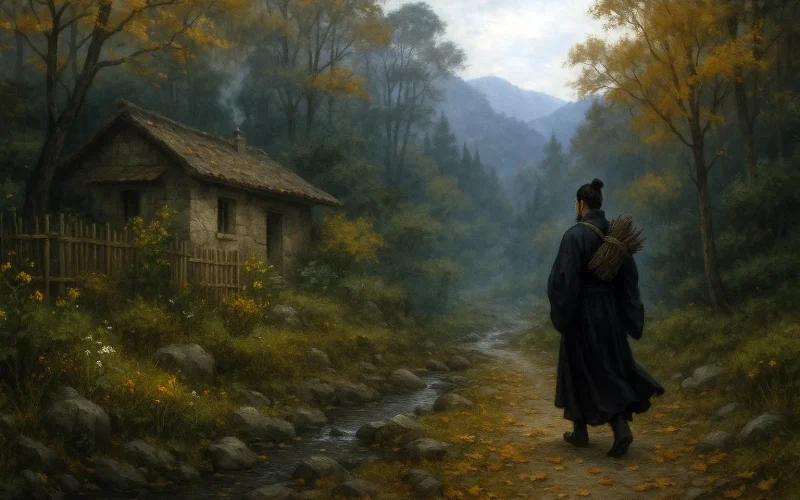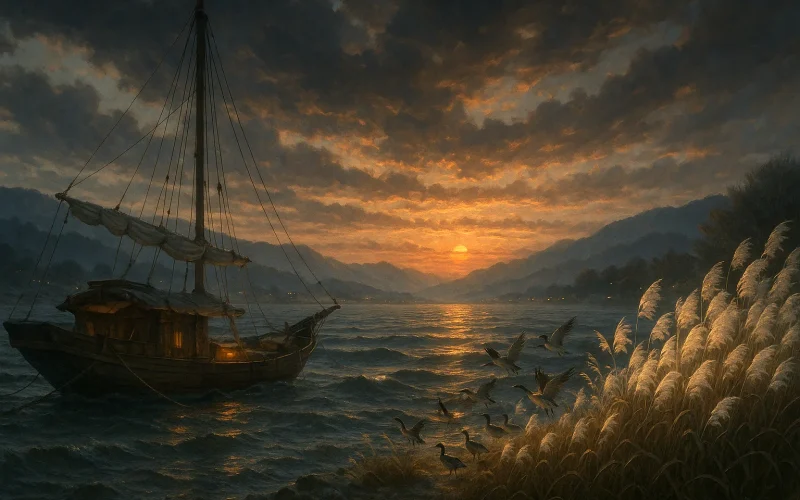My office has grown cold today;
And I suddenly think of my mountain friend
Gathering firewood down in the valley
Or boiling white stones for potatoes in his hut…
I wish I might take him a cup of wine
To cheer him through the evening storm;
But in fallen leaves that have heaped the bare slopes,
How should I ever find his footprints!
Original Poem
「寄全椒山中道士」
韦应物
今朝郡斋冷,忽念山中客。
涧底束荆薪,归来煮白石。
欲持一瓢酒,远慰风雨夕。
落叶满空山,何处寻行迹。
Interpretation
Composed during the Dali era of Emperor Daizong's reign while Wei Yingwu served as governor of Chuzhou, this poem was written in his official residence on a cold, stormy morning. The inclement weather stirred memories of a Taoist friend living in seclusion in the Quanjiao Mountains. Centered on longing, the poem uses the bitter cold as a catalyst to imagine the recluse's solitary life while revealing Wei's genuine yearning for mountain solitude beyond worldly bustle.
First Couplet: "今朝郡斋冷,忽念山中客。"
Jīnzhāo jùn zhāi lěng, hū niàn shān zhōng kè.
This morning—my official quarters cold; Suddenly I miss the mountain-dwelling sage.
Beginning with "cold," the lines establish both physical chill and emotional isolation. The natural shift from urban official ("my quarters") to mountain recluse ("the sage") creates the poem's emotional throughline.
Second Couplet: "涧底束荆薪,归来煮白石。"
Jiàn dǐ shù jīng xīn, guī lái zhǔ bái shí.
By ravines you gather thorny fuel, Returning to boil white stones—Daoist fare austere.
Wei imagines the ascetic's daily routine: gathering firewood ("thorny fuel") and preparing the legendary "white stones" (a metaphor for simple, transcendental sustenance). This portrays spiritual discipline through material deprivation.
Third Couplet: "欲持一瓢酒,远慰风雨夕。"
Yù chí yī piáo jiǔ, yuǎn wèi fēngyǔ xī.
I'd bring a gourd of wine to cheer your stormy night, A distant solace against the elements' bite.
The imagined gesture—bringing wine to share—transforms longing into virtual companionship. The "stormy night" symbolizes both physical and existential hardship.
Fourth Couplet: "落叶满空山,何处寻行迹。"
Luòyè mǎn kōng shān, hé chù xún xíng jī.
Fallen leaves cloak empty peaks—no path, No trace to find where you wander forth.
Nature's obliteration ("fallen leaves") mirrors the impossibility of connection. The "empty peaks" reflect both the mountains' desolation and the poet's unanswered yearning.
Holistic Appreciation
The poem expands concentrically from its initial "cold"—moving through imagined scenes (2), desired connection (3), and finally insurmountable distance (4). Wei's fantasy about his friend's life ("boil white stones") reveals more about his own ideals than the recluse's reality. The closing image of untrackable paths in leaf-covered mountains achieves profound resignation: some spiritual solitudes cannot be breached, even by well-meaning friendship.
Artistic features
This poem skillfully uses scenery to convey emotions, interweaving words like "cold," "storm," "empty mountains," and "fallen leaves" to create a desolate and lonely atmosphere, with restrained yet profound emotions. The language is simple and natural, unadorned yet with far-reaching charm. The entire poem uses scenery to express feelings, and under the guise of missing a friend, it conveys the loneliness of official life and the aspiration for reclusion, achieving an artistic effect where emotion and scenery blend perfectly, with lofty artistic conception.
Insights
Beyond expressing friendship, the poem meditates on the paradox of spiritual solitude—admired yet ultimately inaccessible to those bound by worldly ties. Wei's inability to "find traces" of his friend mirrors every seeker's confrontation with the ultimate aloneness of enlightenment. For contemporary readers, it suggests that the deepest connections sometimes require respecting unbridgeable distances—whether geographical, spiritual, or existential.
Poem translator
Kiang Kanghu
About the poet

Wei Yingwu (韦应物), circa 737 - 786, was a native of Chang'an, Beijing. His poems were collected in the Wei Suzhou Collection, which included poems concerned with the plight of the people, expressions of disobedience to the times and indignation against the world, and descriptions of idyllic landscapes, etc., of which the ones describing idyllic landscapes are the most famous, and have been sung by posterity in particular.











